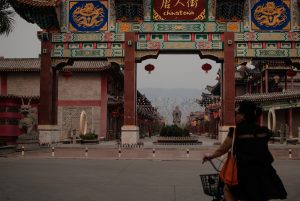Yesterday, the Lao language service of Radio Free Asia published an article claiming that around 700 Malaysian migrant workers are currently being detained at a special economic zone in northwestern Laos. According to the report, which cited a number of anonymous Lao sources, the workers were lured by promises of employment to the Golden Triangle Special Economic Zone (GTSEZ) in Bokeo province where they have instead been forced into work running online scams. According to RFA, the workers “face abuse by resort managers who are demanding a large ransom for their release.”
Over the past year, this has become an alarmingly common story in the Mekong region, as anti-trafficking workers and journalists (including those working for RFA) have slowly revealed the workings of a region-wide cyber-scam industry operated by Chinese criminal syndicates.
Concentrated within an archipelago of Chinese-run special economic zones and other interstitial voids of regulation in Myanmar, Laos, and Cambodia, these operations rely on what are essentially bands of indentured slaves: innocent jobseekers who are attracted by promises of clean and legitimate employment, only to be kept in virtual captivity and forced to make scam calls, on pain of beatings and other forms of mistreatment. As Lindsey Kennedy and Nathan Paul Southern wrote in a special report for The Diplomat in August:
“Survivors and rescuers interviewed in Laos and Thailand described workers trafficked into these compounds as being beaten, electrocuted, starved of food and water, and sold to other companies if they resist or fail to make their targets. Suicides are commonplace, as are videos circulating of handcuffed recruits being tasered in their dorms. Enslaved workers are bought and sold between companies, including through a human trafficking Telegram channel called White Shark.”
The RFA report did not offer substantiation for the figure of 700 Malaysian workers, but it is clear that the scale of the regional trafficking problem is not glaring enough to warrant official diplomatic attention. Indonesian Foreign Minister Retno Marsudi raised the issue with Cambodian on a recent state visit, while Asian embassies have begun to warn their nationals about cyber-scam operations and demand action from the region’s governments (Cambodia in particular) to rescue detained citizens.
The RFA report came after members of Malaysian rights groups and parents of trapped workers protested in front of the Lao embassy in Kuala Lumpur on September 26, calling on the country’s government to help secure the workers’ release.
While many of the scam operations have centered on Sihanoukville, a burgeoning city on Cambodia’s coast that has become a hub of hotel-casino resorts targeting Chinese nationals, a number of allegations have also attached to the GTSEZ, which is run by the Chinese-born tycoon Zhao Wei, a longtime denizen of Myanmar’s shady borderland casino scene.
In 2007, the Lao government granted Zhao a 99-year lease over a large concession along the Mekong River at the “golden triangle” where the borders of Laos, Myanmar, and Thailand converge. The zone, which exists under the de facto sovereignty of Zhao’s Kings Romans Group (or Dok Ngiew Kham Group, as it is known in Laos), has since grown into a palm-fringed casino zone designed to attract tourists from China, where gambling is banned outside Macao.
As head of Kings Romans, Zhao has been credibly accused of involvement in a host of unsavory and illicit trades. In 2018, the U.S. Treasury Department imposed sanctions on Zhao and three associates for engaging in “drug trafficking, human trafficking, money laundering, bribery, and wildlife trafficking, much of which is facilitated through the Kings Romans Casino.”
As with the Chinese casino investments in Sihanoukville, a deluge of reports, including this most recent one from RFA, suggests that Zhao’s enterprise is also enmeshed in the cyber-scam business. In March, RFA reported that “hundreds” of Lao women were trapped within the GTSEZ and that the Lao authorities had rescued some 50 women in the previous year. Around the same time, it also reported on the rescue of 15 Thai nationals from the zone.
It remains unclear whether the Lao government will do anything to address these allegations of trafficking within the GTSEZ.
Just two days before this latest report was published by RFA, the Lao government honored Zhao Wei in a special ceremony for his services to the country’s development. According to the Laotian Times, Zhao was granted the Medal of Bravery (Second Class) for “his efforts and contribution to national defense and national public security in the Golden Triangle Special Economic Zone.” The report characterized Zhao as a “renowned Chinese businessman.”
All of this recalls an observation made by the anthropologist Danielle Tan in 2015, one that I have seen fit to quote previously in relation to the GTSEZ, to the effect that the criminal penumbra of the country’s special economic zones aids rather than hinders the interests of the ruling Lao People’s Revolutionary Party. “For the Lao leadership,” she wrote, “[SEZs] offer an ideal framework to cover all sorts of illicit and illegal activities that are at the same time highly profitable.”
































